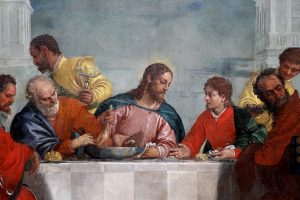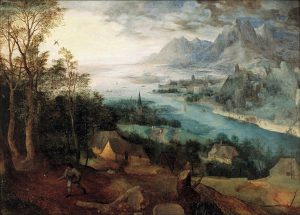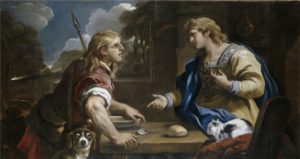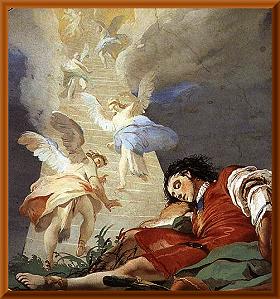Illuminations on the Lectionary readings for July 9, 2023 (Pentecost 6A)
First Reading (Track One): Genesis 24:34-38, 42-49, 58-67
Listen for God’s call, and trust in God.

Detail from the Feast in the House of Levi (1573), oil painting on canvas by Paolo Veronese (1528-1588). Gallerie dell’Accademia, Venice, Italy. (Click image to enlarge)
This theme in Sunday’s readings begins with the story of Rebekah in our Track One first reading, who responded with faithful trust to God’s call. Much as Abraham did when he took his family to a new home and a new land, Rebekah leaves home and family for an arranged marriage to Abraham’s son, Isaac, a man she has not yet met. God promised Abraham that his offspring would become “a great and mighty nation.” Rebekah hears that if she goes to Isaac her children will become “thousands of myriads.” Asked if she will accept this call, she responds simply, “I will.” Her faith may be as great as Abraham’s.
First Reading (Track Two): Zechariah 9:9-12
The prophet Zechariah, celebrating the people’s return from exile and their hope of restoring the Temple, envisions a humble yet powerful king who will come to reign in peace and restore the nation’s prosperity, a Messianic prophecy that Christians can imagine as foreshadowing Jesus. Matthew later will find Jesus so vividly portrayed in these verses that he adopts the wording precisely, including the poetic repetition of Hebrew verse – “riding on a donkey … on a colt, the foal of a donkey” – in his portrayal of Jesus’ triumphal entry into Jerusalem on two animals on Palm Sunday.
Psalm (Track One): Psalm 45:11-18
Sunday’s portion of Psalm 45 is a wedding blessing, a hymn that the original Hebrew describes as “a love Originally written to a princess from Tyre. The princess had come to Israel from that ancient island kingdom and occasional rival to Israel to be joined in a royal marriage. These verses celebrate the pomp and joy of the coming wedding. They also highlight the Psalmist’s hope that future generations will remember and praise the bride, a prayer for future blessing that echoes God’s promise of myriad descendants to Abraham and Rebekah.
Alternate Psalm (Track One): : Song of Solomon 2:8-13
The Song of Solomon, also known as Song of Songs, is a lyrical collection of ancient Hebrew love poetry. Curiously, it, along with the book of Esther, is one of the only books in the Bible that does not explicitly mention God. Rather, we are left to find the image of God in the joy of giving and caring love. These verses are understood as a rhapsodic song of springtime, but their metaphorical evocation of love speaks to our hearts even during summer’s heat.
Psalm (Track Two): Psalm 145:8-15
This psalm of praise, one of the 73 psalms traditionally attributed to King David, echoes today’s reading from Zechariah in its vision of a humble, powerful king who reigns in peace and prosperity. This kingdom of glorious splendor, the Psalmist sings, is not merely a kingdom for here and now, but one that is known in glory to all people. It will be an everlasting kingdom that endures through all the ages.
Second Reading: Romans 7:15-25a
In our recent second readings, we have heard Paul assure the Christian community in Rome that when we die to our old lives enslaved to sin through baptism, we are born to a new life freed from sin through God’s grace. Now, declaring himself “a wretched man,” Paul acknowledges that it’s not easy to leave sin behind. Even when his mind wants to do what’s right, Paul confesses, he can’t get rid of the sin that lives within him. He can’t fight sin on his own – and neither can we – without God’s help through Jesus, who frees us from the enslavement of sin.
Gospel: Matthew 11:16-19, 25-30
Jesus seems frustrated. Preaching to crowds around Capernaum in Galilee, he likens them to children bickering and whining. Perhaps Jesus feels irritable because some people who considered ascetic John the Baptist’s call for repentance crazy and judgmental are now criticizing Jesus’ joyous embrace of life as evidence that he is a glutton and a drunk, who dines with sinners and tax collectors like Matthew. But then Jesus pauses and thanks God. His words of hope for Israel’s children and infants turn gentle. Can we hear a foretaste of the Beatitudes in these words, the promise of God’s Kingdom coming to all who bear burdens and labor under a heavy yoke?



